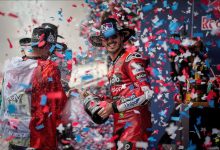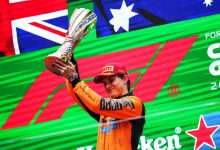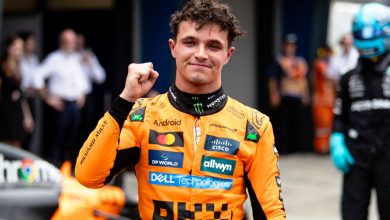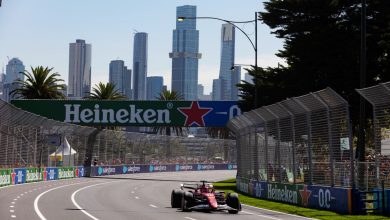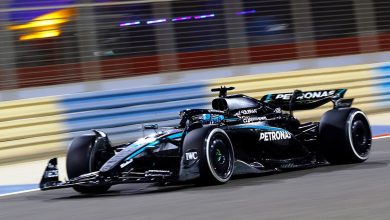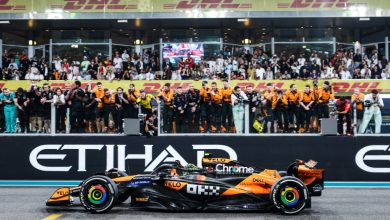Yes they are scary deterrents but no team orders, says Hamilton
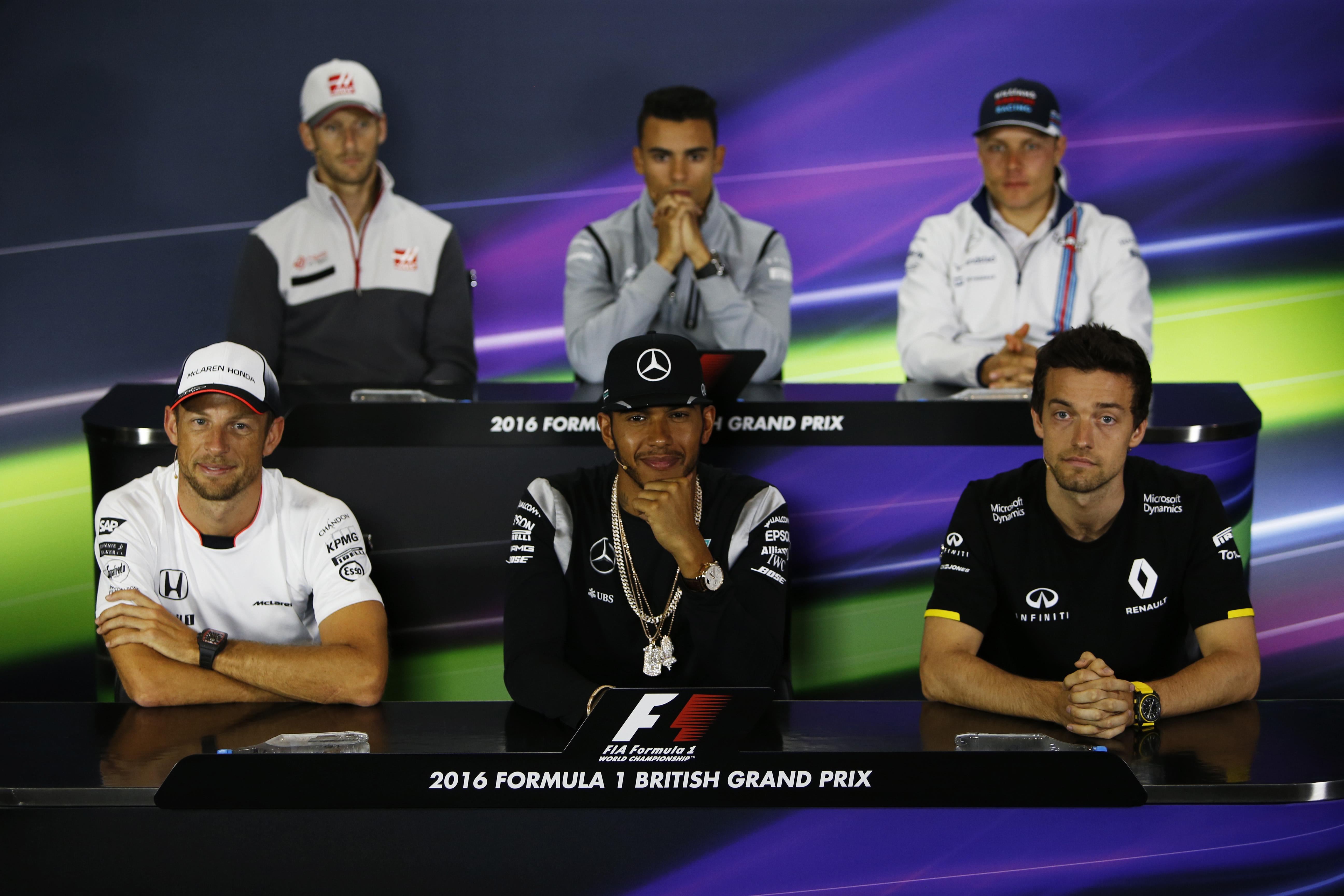
DRIVERS – Lewis HAMILTON (Mercedes), Jenson BUTTON (McLaren), Jolyon PALMER (Renault), Valtteri BOTTAS (Williams), Romain GROSJEAN (Haas), Pascal WEHRLEIN (Manor)
PRESS CONFERENCE
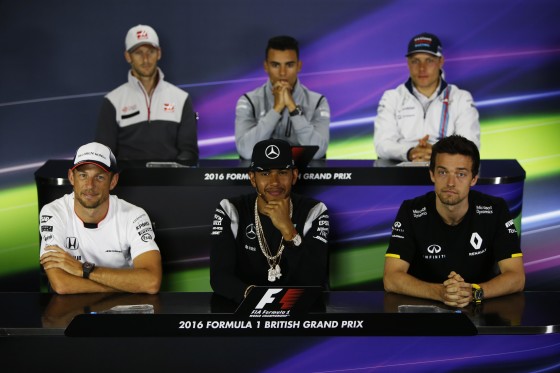
Hamilton-centre-front-row-at-the-Thursday-Press-Conference.-An-FIA-image
Jenson, let’s start with you, 2009 Formula One World Champion? A positive result in Austria showed clear improvement in car pace. Was that circuit and tyre-specific or do you expect that to roll out this weekend and the weekends to come in the best few weeks?
Jenson BUTTON: First of all, good afternoon. I would say it was weather-dependent rather than tyres. I think the conditions helped us quite a lot. In the wet we were pretty quick and in the drying conditions we made the best of it. Put it P5, and obviously got lifted up to P3 and was running P2 for a bit of the race but were quickly put into our place. But considering that, I don’t think P6 was too bad. The three teams in front of us were a massive amount quicker than us but to beat the cars that we did, we did alright. Coming here I don’t expect to be qualifying fifth, unless we get some really good British weather and have a good downpour, which I’m hoping for, because then I think we do have more of an opportunity. Yeah, we’ll see. Then race is going to be reasonably tricky for us here. The car is very good in low-speed corners. High-speed corners we don’t really know. We do have some upgrades, aero-wise, engine-wise, so it’s moving forward. It’s just never as a quick as you hope is it. But the guys are doing a very good job of bringing something to every race and on the power side it should be a positive step.
That’s performance, but in nine races McLaren has only managed to get both cars to the finish on three occasions. Is that because you are pushing it so hard in development or is reliability a bit of a concern?
JB: I don’t think so. If you look at a lot of teams, cars aren’t finishing and yeah, so I don’t think that is an issue. I would rather be pushing things to the limit and getting better results and possibly having some reliability issues. We’re not fighting for a world championship this year, far from it, so it’s important for is to try to maximise what we have, enjoy the weekend and get the best out of what we have on the weekend and I think they are doing a good job of balancing that.
Thank you. Romain, turning to you, you were back in the points in Austria, your fourth time this year scoring points, the first time since Russia. It was based on a long stint on the tyres. Were you encouraged by what you achieved in Austria?
Romain GROSJEAN: Yeah, I thin Austria was a good weekend for us. I think qualifying could have been a bit better but then the car felt great for the long run on tyres. We understood a bit better how to use them, so hopefully we can transform that and keep it going here in Silverstone. Then in the race the car felt good. We managed to get the one-stop strategy that we planned working. It’s a shame we didn’t have enough speed to just overtake the McLaren but generally very happy with the result.
It’s only the first season for the team but performance seems to have fluctuated all season. Do you feel you now understand the strengths and weaknesses of this car, enough to establish a good baseline for next year’s car, for example?
RG: I think we started very well and then we had some issues, very different every time, that didn’t allow us to score points. I think Baku and Canada we did have the chance to score points but once we had debris in the radiator and the other time we lost the front wing. That cost us a shot at good results. I think we could have been a bit more consistent but it’s a brand new team, first year and things like that you expect that to happen. Hopefully now things are a bit more settled and we can try to score points as much as possible.
Pascal, turning to you, your first Formula One points last time and the first for Manor under that name as well. It was based on getting the tyres into the right operating window, which has been a bit of a struggle for you and the team this year. Do you think you have learned the magic formula now?
Pascal WEHRLEIN: I don’t think so. I think the new surface in Austria helped us a lot. It was quicker and so we put more energy into the tyres and it helped us a lot. We were in the working window for qualifying and for the race and we could extend the run in the race. In qualifying, on the first lap the tyres were there and I could do a very good lap with P12 in Q2 and that’s it.
You’re coming from a track that you knew very well from your previous racing experience to one here at Silverstone that you have never raced on I believe. What are you looking forward to about Silverstone, what’s exciting you?
PW: I think there are many nice corners, like… I don’t really know the names, but it’s Copse of Hops…
RG: Maggotts, Becketts, Chapel…
PW: A bit strange names but still the corners are really nice, really high-speed corners. I like that challenge, basically. With the Manor car it won’t be easy because we are struggling a bit with downforce. In general, I am really looking forward to drive this track tomorrow. I’m always looking forward to new tracks.
Thanks. Turning to Valtteri Bottas, a podium finisher here a couple of years ago. Of course you know all the corners, you’ve been through them many times in the past, one of your favourite tracks I believe. It’s been a good track for Williams over the past couple of years. This year do you arrive here feeling optimistic you’ll be able to compete on that same level again, because at other circuits this year it seems to have been a bit more of a struggle for you?
Valtteri BOTTAS: Yeah, definitely. It’s really cool to be in Silverstone, one of my favourite tracks. It’s a home grand prix for Williams so it’s always great. There is a very special atmosphere racing around these high-speed corners. Of course we have high expectations, but we will need to wait and see how the practice goes, because there have been some circuits where it’s been very close… I mean, just a few races ago we had high expectations but we couldn’t execute that. We just need to do everything we can in the practice, find a good set-up with the car and try to get the tyres to work perfectly. That’s been the main issue in Baku and Austria. So yeah, just waiting for quali and race and hopefully we can be high up there.
Now, I think that I’m right in saying that you’ve had the opportunity to drive some of the great Williams F1 cars from the past around Silverstone in your time in with the team. Tell us about how that felt, any highlights, what the experience was like?
VB: Yeah, I’ve driven Keke Rosberg’s wining car from ’82 and Damon Hill’s car from the ‘90s. Yeah, it’s been really cool trying out those cars on the same track that I’m driving in nowadays Formula One. Of course they are very different. Completely different behaviour. The technology has gone so much forward nowadays. But I have to say that with the cars we have now it’s a real enjoyment driving here in these corners, so I wouldn’t change that.
Turning to Jolyon, first British Grand Prix as a Formula One driver. Some 135,000 people are expected here on race day. Everything has built up to this I guess, so what does this weekend mean to you?
Jolyon PALMER: Well, it’s huge. My first British Grand Prix, a race I’ve been looking forward to since the start of the year really. So a track I know really, really well, I’ve been racing here for a long time. And I love the track as well. The layout is awesome, lot of fast corners. You need a lot of commitment but I really enjoy it. And then the crowd, which is every year fantastic here. Been coming here myself for many years and now to be racing Formula One here is going to be pretty special. So I’m looking forward to it.,
Now you out-raced Magnussen in Austria, but you haven’t managed to get into Q2 for a while, in fact I think it’s the first race of the season. So is qualifying the clear for you at the moment?
JP: Yeah, 100% really. For us we have been quite close – Montreal I was only 15,000ths off Romain to get to Q2. It was really close. Austria as well we were OK but then we had a red flag and we struggled to get the last set of tyres on. I think we’re not far away and hopefully this weekend we can find the last bit. I think the track should suit us more than the last few. And then once you’re in Q2, you’re starting a few places higher, you’ve got the pace to start a few places higher and you have more chance of scoring points. I mean they are the two aims: to get into Q2 and then score some points.
Turning to Lewis, defending world champion of course, a three-time British Grand Prix winner. Just mention to Jolyon there, 135,000 people expected here on race day, so a lot of expectation, but lets’ talk about the championship. Twelve races to go, 11 points behind your team-mate, nearest rival challenger is 50 behind. Do you see this now as a two-horse race and how excited are you about it?
Lewis HAMILTON: I don’t think it’s a two-horse race. I should take a page out of your book [Jenson], good afternoon everyone. No, I mean, it’s the same as it’s been since the beginning. It’s still a fight. I think Ferrari are still there. Sebastian has had a couple of unfortunate races but they are still a force to be aware of. Every time I look up the cameras go… watch this!
JB: We need some silent shutters, can we do that?
LH: We do, we do. It’s definitely a nicer position to be in. I’ve definitely seen worse days and worse times, obviously I was 43 points behind at one point. It’s still behind but it’s not impossible to come back.
Mercedes bosses met with you and Nico and the team’s issued a statement in the last couple of hours saying “in the last five races there have been three incidents that have cost us over 50 points in the championship. We have therefore strengthened our rules of engagement to include much greater deterrents to contact between the cars. With these in place we will our drivers to manage the situation. Their destiny is in their own hands.” Now clearly, last time out in Austria, the stewards found that the collision was your team-mate’s fault but what’s your comment on the statement today and how will it affect the battle going forward?
LH: In all honesty, I think our destiny has always been in our hands, so it doesn’t realty change anything. We are still able to race, no team rules or team orders or whatever it’s called, which I think is great for the fans, so I think everyone should be excited.
And you’re both completely clear on what it all means and what these “much greater deterrents” are?
LH: Yeah.
Are they scary deterrents?
LH: I should say yes.
You should?
LH: I guess I should say yes.
QUESTIONS FROM THE FOOR
Q: (Dan Knutson – Speedsport Magazine) Two questions for Valtteri. Has the team discovered what went wrong in the last race and going into the second half of the season is Red Bull still a target or are you looking over your shoulder at Force India?
VB: First of all with Austria, it was a really disappointing race for us. Like Pascal and Jenson said they could really use the conditions to their benefit with the tyres and the temperature and the new asphalt but for us it was completely the opposite, so we really struggled massively. I think there are multiple factors. I’m still yet today to have a better look with the engineers about it. I can say we don’t 100% understand our performance yet. We have some kind of ideas but we are still analysing everything. But the good thing is at least we now to a more normal type of tarmac, not new at least, so hopefully it works out better. With the Red Bull, definitely they are strong and they are getting stronger all the time. But we also have some updates lined up. I am trying out the new front wing that Felipe tried out in Austria. I think we both have and also some other updates lined up for the next few races. With that in mind then if we can get better results than Austria and if we start to understand things better and really use those tracks that are good for us, getting string points for our cars, then it is still possible. I think it is a good target for us to try to put pressure on them, try to beat them in the races and if we can’t make it then at least we should finish ahead of Force India.
Q: (Sean McGreevy – CSMA) Question for Lewis, you, Jim Clark and Nigel Mansell have all won three races, British Grands Prix at this circuit. If you win on Sunday you’ll be the most successful British driver at Silverstone. Have you thought about that and what would it mean to you if you won?
LH: Is that true? Nigel has four. [one at Brands Hatch] Ah, I see. No pressure then! I didn’t know that. Ask me if I get there. It doesn’t change anything into the weekend. As Jenson said, it’s a great thing to be able to arrive here and have the incredible support we have. We’ve definitely got the best following of fans here and the Brits turn out regardless of what the weather is, they turn out in their thousands and it’s just a very proud experience being here and being able to represent all the Brits. I’m still of the mind that… I remember being here when I wasn’t even in Formula One and one day dreaming of driving Formula One, so it’s just crazy to think I’ve had those wins here and I hope that I can continue to, along with the drivers here, raise the flag proudly.
Q: (Peter Windsor – F1 Racing) Along the same lines Lewis, as time has gone on, this race has grown bigger and bigger for you and for the British sporting public and I wonder if there is a point where you have to be very disciplined about it not affecting your weekend performance and how you approach the weekend to find that balance between what you normally have to do and this massive audience which you find yourself facing?
LH: Honestly, I personally draw a lot of energy from the fans. There’s races where you have a few and races where you have a lot. You come to Silverstone and that’s when the energy is in abundance. I just absorb that. Seeing people that have saved up there money to come and spend their money here and put all of their energy towards you getting across the finish line first, that’s… pretty much impossible to describe how amazing that feels. And when there’s so many of them, all drivers will talk about it giving you that extra tenth or two on the weekend and I generally find that is the case. So the more and more there is, hopefully there’s more time in it. Don’t know if that’s the case, I hope so! I’d like to believe so.
Q: (Andrew Benson – BBC Sport) Has Toto given you any guidelines about how you can race with Nico, side-by-side now? For example, could you do what you did in Suzuka or Austin last year under whatever new guidelines there might be?
LH: Unfortunately Andrew, everything that’s been said is private and confidential so I’m not allowed to… it’s a good question. We’re still able to race, and obviously in those races the stewards deemed me racing, so we… I… will still race like that.
Q: (Qasim Abdul – Renaissance Foundation) Lewis, my question is in two parts: how can young people get into Formula One first of all. Because it’s not broadcast as much as other sports. Second, when we spoke to you, you were very interested in “Peace”, and right now with all the media that’s going on, how can we spread peace [unclear] Would you like to come with us to the Nobel Peace Prize in Norway?
LH: That sounds pretty cool. I’ve never been invited. Is it a good gig?
It’s in Oslo, so it’s really cold, but good…
LH: Maybe we should chat about that off-line. I’m always up for good events. Peace. For us as a team, fortunately we have people higher-up and obviously we’re adults so we, with our bosses, we work very hard, or they work very hard to try and dilute whatever tensions there are between all the people in the team. Whilst it’s not the easiest thing to come across, it’s something that I think, as men and women, we are able to reach an agreement at that point. So, while at one specific moment you might be angry, there’s always peace on the horizon. The first one, it’s really hard. It’s not like the other sports, like football, tennis, basketball. Not taking away from how hard it is to get into those sports but growing up I could go and buy a basketball and play in my driveway. You could play at school, you could play anywhere you want. Go-karts, you have to go and find a kart track, you can hire a kart but it’s expensive. It’s very expensive, and that’s the issue. But there are people, like Carolyn Hoy who does the karting championship in the UK, who really try to make it manageable for all families. Ultimately there’s going to be a wealthier and those families that have less money – but I think Jenson and I, from what I know of Jenson’s background, we both didn’t have money but we both got here which shows it is possible. There is always a way. Where there’s a will there’s a way and our parents somehow found that way. Jenson’s Dad worked so hard – he even did my engines, at a decent rate as well! He didn’t overcharge us! Our job is really to encourage kids. And it’s not just for motor racing. It really is for whatever it is that they’re into. I guess this is a platform for us to real inspire people in whatever genre or sport or form of work or whatever ambition they have, to fight for it and not give up, even though times do get low. I think the races we have that are good and the races that are bad, hopefully through those experiences we show that.
Q: (Livio Oricchio – GloboEsporte.com) Lewis, if you were a team principal – let’s suppose – in the circumstances you are facing now with Nico, what would be your reaction? You would let free completely? You would give some orientation? Because you also would answer to the president of the company, for example.
LH: Me personally, I think I’d be in a better position because I’m a racing driver, so I know what you would do, and what I would do on a race track and what I would not. Our great engineers and generally individuals who don’t race, it’s difficult to understand the decisions we take when we’re racing at 200mph. So I think I’d be in a better position – but I’m not going to tell you what I would or would not do. I would want them to race, that’s for sure, and I wouldn’t bring in team orders ‘cos racing is why I’m here and why I’d want to be there: to see the guys race. I’d probably be more understanding that, when you have cars that are racing first and second, there are going to be times, out of 60 races together… I don’t know if it’s five collisions we’ve had, I don’t know how many collisions we’ve had, but it’s a small amount compared to the amount of successful races we’ve had and 1-2s we’ve had. So, that’s me.
Q: (Sarah Holt – Channel Four) Just a really simple question for the British drivers: what’s your favourite thing about coming home to race here in Britain? Whether it’s on track or something you do off-track like seeing your families or watching TV or something…
JB: Watching TV or something! That’s the best question. I’m not taking the mickey, it was a very good question. The best thing about the British Grand Prix. We can say that we love the circuit because I think every driver likes Silverstone. It’s flowing, there’s so much history here, whether your car works here or not, you still enjoy the circuit. As a British driver, it has to be the fans. It has to be the support that you get here. I camp here, as a few of the drivers do, and when you drive from the campsite – motorhome site I’ll call it, glamping I think it’s called – you drive in, see the people coming in, see the Union Jacks, and obviously the different team kits. They don’t just come here to support the British drivers, they come here to support whoever they like and whatever team they like. But if you drive past someone with a Renault hat on, and you’re a British driver, he’s still going to cheer for you. And he’s still going to say good luck for the weekend – or a Mercedes hat – because they’re so supportive of Formula One as a whole, not just individuals. Which is what makes this race so special. I think for everyone a race that stands out because of that. Also, after the race we get to go to the stand, where they have the live bands, and standing up there, whether you’ve had a good race or not – and most of mine haven’t been good here – you stand up there and there’s just a sea of people, different flags, people that are British, people that are from all over the world that come to watch this race, the atmosphere’s electric. It’s a very special feeling. Then you head back to the motorhome and have a Bar-B with your mates. It’s old-school. Like the karting days.
LH: I’m trying to think what it is because you’ve now taking my answer, so I’ll pass it to Jolyon for a second.
JP: Not getting onto a plane to get to a race is a bonus. Just an hour up the M40 is quite nice. It’s the same as Jenson, it’s the fans, I think. Home support, friends and family that can come up as well but just generally the fans are pretty awesome here.
LH: He’s covered then all!
JP: I’m just going broad so you’ve got no more options!
You mentioned the fans earlier Lewis, but I wonder also racing here, as Jenson said, it’s old-school. Does it basically just bring back a lot of memories. Does it connect you with your childhood and all those races?
LH: What I love firstly, is landing here the other day, whether it’s going home, seeing family, driving down the countryside where I grew up, seeing friends who I grew up with. I guess just being around something you’re used to. We’ve been to Baku, for example, and it’s all new: you don’t know the streets, you don’t know the restaurants. Here you can go to your usual favourite restaurants, meet up with your friends, it’s an amazing feeling. Last night I caught up with a couple of friends that I grew up with, that I met 21 years ago. It’s that but most importantly, as Jenson said, it’s when we arrive here. It’s the history, it’s knowing that we’re going to be one of only 22 people in the world that get to be here and one of the relatively small amount of British drivers, compared to the amount of people in the world, who get to come here and represent their country. It’s just an amazing feeling when you get on your home turf. I would imagine it’s similar for football fans in their own stadium with their own fans… the majority of fans are there for them. It’s unbelievable. It’s as powerful as, for me, the energy is as powerful as the sea. Like a wave. It’s unreal. It’s so powerful it’s hard to absorb – but you absorb as much as you can. It’s amazing.
Q: (Angela Bern – SID) Lewis did the reaction of the crowd last Sunday in Spielberg affect you in any way? They were booing during the victory ceremony. Is that something that affects you, that you are thinking about afterwards?
LH: Fortunately not at all. I don’t know if you saw my Snapchat but I had an amazing time literally… once we got away from the track, leaving, went to a really beautiful place for the last couple of days and had the best two days of the year. And also, someone mentioned to me that potentially that someone… some of the fans didn’t see exactly everything what happened and also a comment from someone that… someone told me that someone said that I had rammed Nico off. I understand that that was the first reaction and whether some of them still feel the same away, it doesn’t really make a big difference. This weekend, the cheers will make those boos so small which is a good thing.
Q: (Mikolaj Sokol – Rzeczpospolita) Lewis, when you’re battling on the track, attacking or defending, what’s the balance between rational thinking, preparation and analysis, and just pure racing instinct and reflex? What goes on in your mind in those split seconds when you have to take a decision the track?
LH: Can you just tell me that again? I’m just struggling to… So when I’m racing for the championship, the balance…
Q: (Mikolaj Sokol – Rzeczpospolita) No, when you’re battling on the track, attacking or defending against any other driver, what’s the proportion between thinking, analysing and preparation, when it comes to every move on the track, and pure racing instinct in those split second decision?
LH: Well, the more of every single one of those, the more instinct, the more preparation and the more… yeah, you want to have it all. Some of us drivers have more instinct, some of us drivers have better preparation, but we’re all working on our skills throughout the years to be the best at overtaking and analysing manoeuvres, so when I’m trying to make a manoeuvre, for sure it’s analysing the weaknesses of the car ahead, analysing your strengths and then planning and executing and in executing it takes a lot of instinct to know… you know, when you go for a manoeuvre, you basically have a calculation, a percentage of your chance of overtaking. Sometimes it’s 100 percent, sometimes it’s less but as racing drivers, we even go for the small percentages and that’s what makes us racing drivers and if we don’t then we’re not racing.
Q: Any others? Valtteri, does it come from experience, how much of it is experience, how much of it is instinct?
VB: I think it is both really and of course it depends completely on the situation. Sometimes you don’t have time to plan things, if something comes in front of you in the race and you suddenly need to go with your instinct rather than planning. But it is funny, sometimes, when you’re really at your best, really focused and sometimes it feels like there’s plenty of time to think about the situation, what to do and how to make the move and then if you see it in the replay for example, it just looks really quick, completely depends on the situation.
Q: How about you, Romain, because you had to consider how much risk was appropriate? You went through that process and it made you a better driver.
RG: I knew that would come to me! I messed up a few times. I think the start, for example, is instinct because you cannot prepare for what’s going to happen in front of you and you cannot think ‘well these guys are going to turn right and they’re going to go left and so on’. It’s all at the minute and that’s where you really need to take the right decision and aim for the right objective. And then during the race, there are other times as Valtteri says where you can take your time and you can actually follow another guy for a few laps and for a while and then you know that you’re much faster and I can actually go for it and it feels more natural but it’s well prepared. Another case where a car just comes out of the pits in front of you and in the instinct and decides to go right/left.
Q: (Graham Harris – Motorsport Monday) Romain, arguably last year you had a pick of where you could go. You could have stayed – if the rumours and the gossips are to be believed – you could have stayed at Lotus. You could have gone to other teams but you chose Haas. Nine races into the new season with a new team, what are your thoughts? Are you happy you’ve made that decision? What do you want to do next year and also tell us a bit about NASCAR.
RG: Well, I’ll tell you one thing. On the 9th of September last year, I made my decision and I didn’t regret it from there. I like to think before, but when I stick to one plan then I don’t like to regret. I think I’m living a very nice experience in a very good team, very proud to be driving for the US, for a US team. Very proud to have scored a first time ever in Formula One, the first points for Haas so all of that together, it’s a very nice experience and I don’t regret one thing that I’m doing and the more we go, the more we learn, the more the people I work with are really following the same trend so that’s great.
NASCAR, when I was sitting on my sofa watching the Sonoma race, I wished I was there. It looks good fun, I liked the last lap with Tony Stewart winning the race and pushing Martin Truex a little bit wide but it was great fun. I do need to get a few laps, a few days in the car, do some laps, get some good sensation and then I will come to do a race.
Q: (Ralf Bach – Autobild Motorsport) Lewis, if in future you will get some team orders – you or Nico, you will get some team orders – would you follow them or would you react as angry, two years ago when your team told you to let Nico past but you didn’t?
LH: Oooh, buddy, you’re feeling in a certain way, hunh? Hey, you’ve just got to let it go buddy, that was a couple of years ago. I would, that’s my job, that’s what I get paid to do. That’s what we agreed today, that’s what’s in our agreement. If you go back to 2014 and if you listen to the manuscript, you understand I didn’t say no. I just said I won’t get in the way. He didn’t get close so…
Q: (Peter Windsor – F1 Racing) Just going to back to instinct versus experience, Valtteri I’m just wondering: turn one at Bahrain with Lewis? Was that instinct or was that experience, maybe get some Lewis input here?
VB: It was both, I think 50-50. For sure coming into the corner I remember seeing a gap there, I was sure I could get inside and try and keep my position. Not sure Lewis maybe saw me and I was also sliding at the same time, slightly drifting off the apex, not a lot but… Yeah. I don’t know how Lewis saw it. I would say that was a 50-50 situation.
LH: I can tell you, I didn’t see it, I just felt it. I don’t know, it was a racing incident.
Q: (Frederic Ferret – L’Equipe) Lewis, speaking about you being a team boss. Seeing what Nico did last week, would you understand it as a racing driver?
LH: Didn’t I just answer that question? I’m pretty sure that I did say that if I was a team boss I would be in a better position to understand the situation because I have driven and know what I would do in that situation. I do believe so. I’m pretty sure I said that before.
Q: Would you accept from Nico’s point of view, would you be more understanding of Nico’s point of view?
LH: Any more than I am now? I don’t really understand it, more accepting than what?
Q: (Frederic Ferret – L’Equipe) As you are a racing driver, seeing it as a racing driver, would you understand what he did?
LH: Well, I understand it now and I would understand it then. It doesn’t mean it’s right or wrong. I would have to take an opinion, I would have an opinion whether it was right or wrong but I would understand it just as I do now.
Q: (Casseem Campbell – Renaissance Foundation) On a more positive note…
LH: It’s all about positive energy, yeah.
Q: (Casseem Campbell – Renaissance Foundation) To Lewis and Jenson. I’m a big believer in the mental part of any sport as I’m a tennis player as well. Well, not a tennis player, I play tennis. I wanted to know, in terms of Formula One specifically, what are the main nuance qualities you feel that a Formula One driver has to have to be successful?
LH: Good question. I think… is that for all of us?
Q: To you and Jenson.
LH: Go first.
JB: You’ve started mate, go for it.
LH: Ah s***. I think it’s very similar to other sports. I watch other sports like tennis and I’m amazed when – and I always refer to Federer as one of my favourite players – when a player’s up and I understand the positive mental space you’re in when you’re up and then when you make a mistake, how you don’t drop it all or lose it all, how they come back from a couple of sets down, for example and those kind of things. You take a lot of energy, I think I try to take a lot from that because for us it’s kind of similar, you know? We have our ups and downs, you have your good days and your bad days but as a racing driver, for us it’s a long long season, it is about focus, it’s about… the training helps massively. You go out for a run, it helps you really… you have a lot to think about. I think for every single person it’s different but for me, if I go and work out whatever it is, it helps me stay focused. It is about keeping the eye on the prize, it’s about learning through every single experience, whether good or bad. Hopefully you have more… hopefully you learn more through the bad times because that’s how you grow. You learn less in the good times I would say. But if you understand to learn and enjoy from the bad times, then you appreciate the better times. I don’t know if that’s really… I don’t think I’m answering it, I’m leaving you space to answer it. The nuances in the performance…
JB: I think Formula One is a sport but it’s not as physical as most sports so it has to be mental. A lot of it is about feeling but mentally to have to be in the right place, you really do. Off the back of a good race, you have so much more confidence coming into the weekend. I think we’ve all been through tough times in our careers and some people, they fall into the tough times and never come out again, and you see that with racing drivers which is a shame because you know the raw talent is there. So it’s not just about being strong enough as an individual because you can only learn that with time and it can be too late by the time you’ve learned that, you are already cast aside for another driver. So you need good people around you to support you, family and obviously close friends but also the people you work with. Formula One is a massive team sport and it’s not just about people doing their job correctly, building the front wing or designing the rear wing or what have you. It’s about making sure that you are in the right frame of mind and everyone working together and making sure there’s a positive attitude, because it’s not just the drivers that have difficult days, it’s the mechanics as well and the engineers who have a bad day if they make the wrong call. They’re told they’ve made the wrong call and it hurts, mentally, a lot. And it’s about you all pulling together in those difficult times and making the difference. It’s a massive mental game, Formula One, and a lot of people don’t realise that.
LH: Ultimately down to the positive mental attitude. I think that’s the key, as Jenson said.
eom/FIA transcript of the Thursday Press Conference
